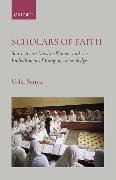Mehr lesen
Scholars of Faith looks at South Asian Muslim women acquiring religious education in India as well as around the world. It is based on fieldwork in a girls' madrasa in north India as well as an on-line Qur'an class whose students are middle-class South Asian Muslim women with college degrees and have chosen to learn the Qur'an in Arabic. It reflects on the motivations and impact of this education on the lives of these modern South Asian Muslim women.
Inhaltsverzeichnis
- Acknowledgments
- Introduction
- Part 1: Iman, Ahkam, Adab
- 1: Muslim Girls' Education in North India in the Twentieth Century and Beyond
- 2: Jami'a Nur al-Shari'at, a Barelwi Girls' Madrasa in U.P., India
- 3: Pedagogy and Daily Life at Jami'a Nur al-Shari'at
- 4: Attachment to School: The Madrasa and the Islamic Public School for Girls Compared
- 5: Life after the Madrasa
- Part II: Iman, Ahkam, Da'wa
- 6: Al-Huda International: Muslim Women Empower Themselves through Online Study of the Qur'an
- 7: Al-Huda's Intellectual Foundations
- 8: Al-Huda Onsite and Online: Teacher-Learners and Students in North America
- 9: Student Narratives: Personal Transformations and Reorientations
- Conclusion: Why Now?
- Glossary
- Bibliography
- Index
- About the Author
Über den Autor / die Autorin
Usha Sanyal is an independent scholar whose prior research has focused on the history of the Barelwi or Ahl-i Sunnat wa Jama'at movement in British India. Her book, Devotional Islam: Ahmad Riza Khan Barelwi and His Movement is in its 3rd edition (Yoda Press, 2013). She lives and teaches in North Carolina.
Zusammenfassung
Since the late twentieth century, new institutions of Islamic learning for South Asian women and girls have emerged rapidly, particularly in urban areas and in the diaspora. This book reflects upon the increased access of Muslim girls and women to religious education and the purposes to which they seek to put their learning.
Scholars of Faith is based on ethnographic fieldwork in two institutions of religious learning: the Jami'a Nur madrasa in Shahjahanpur, North India, and Al-Huda International, an NGO that offers online courses on Islam, especially the Qur'an. In this monograph, Sanyal argues that Islamic religious education in the early twenty-first century — particularly for women — is thoroughly 'modern' and that this modernity, reflected in both old and new interpretations of religious texts, allows young South Asian women to evaluate their place in traditional structures of patriarchal authority in the public and private spheres in novel ways.
Zusatztext
The methodology adopted by the study is highly innovative. The central argument [of the book] that contemporary Islamic religious education is thoroughly "modern" opens up new vistas of research on "Muslim modernities".

